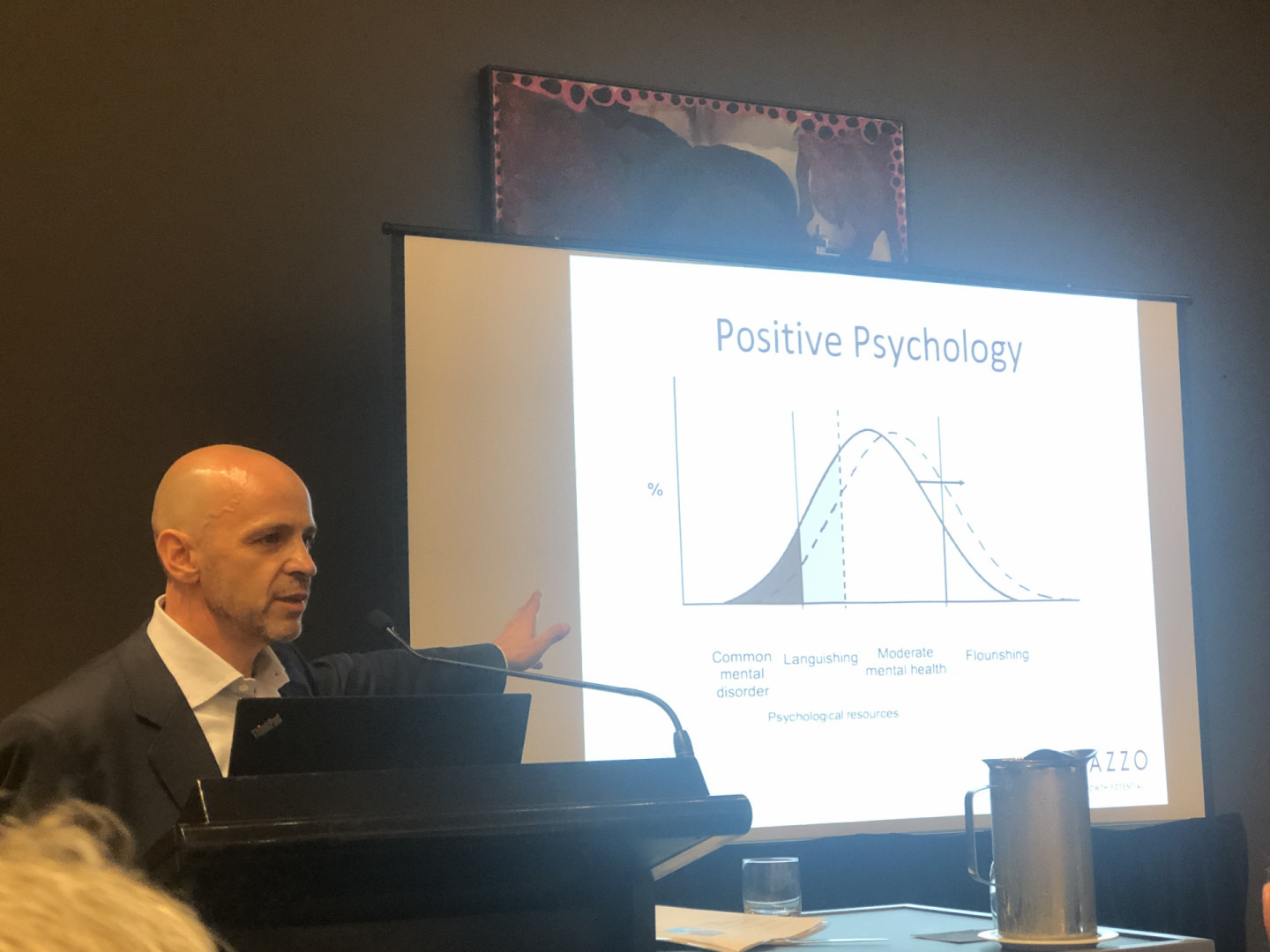

Mark Carrazzo (1982), a business consultant and founder of BE YOUR BEST NOW, has delivered a thought-provoking and inspiring address as Guest Speaker at the Old Paradians’ Association’s first monthly luncheon for 2020.
Speaking recently to fellow former students at RACV City Club, Mark offered a wonderful insight into the power of positive psychology and how to increase levels of happiness internally without the need for medication or improvement in your external circumstances.
Mark is a Fellow of the Institute of Managers and Leaders, a lawyer and a partner of the Redgum Wealth Group. He has a genuine interest in and positive approach towards the people and businesses with whom he works.
He holds a Bachelor of Law, Bachelor of Economics (Major in Accounting) and Graduate Diploma in Applied Finance and Investment (FINSIA). He also recently attained a Level 1 Wellness Coaching Certificate from Wellness Coaching Australia.

The following is an edited version of Mark’s address;
It’s certainly an honour for me to be here. I proudly went to Parade - so did my three brothers, my Dad and my uncle – and I’m honoured to be given the opportunity to talk to you gentlemen about a topic some say could be the most important goal of life, which is to achieve happiness.
What I am talking about today is not untested self-help. It’s not pop psychology, it’s a form of psychology based on real science and evidence, and whilst you might be sitting there saying ‘Yes, intuitively I accept what Mark’s saying today, I’m here to deliver an important message that there’s real evidence behind this, and I don’t think that any person, organisation or school can ignore it.
Positive psychology has basically been around for about 40 years and gathered momentum over the past 20. It tends to explore things that make individuals improve their well-being, their happiness, their optimism and their positive mindset. Some might say that happiness is the Holy Grail of life and I don’t want to get in any deep discussions with people from the outset, but it’s certainly got to be up there with something worth achieving.
Not only is it worthy of achieving – there’s real benefits if you do.
The leader of positive psychology is a gentleman called Martin Seligman - and I’ll have a little bit more to say about him later- but he maintains that the major objective of life is to flourish, that it’s not just to exists, but to flourish or thrive. They are words at the heart of what we want to see in every individual in daily life.
What do we know? We know that there’s an impressive body of research out there that shows that trying to be happy by changing life circumstances will ultimately fail. Less than a year after potentially life-changing circumstances, such as winning the lottery, people’s happiness levels return to those who haven’t been so lucky.
Fortunately, the opposite holds for people who have gone through tragic events, such as those losing eyesight, who after 12 months or so will return to the same happiness levels.
Shawn Achor, one of the leaders of this movement, used to work at Harvard University. People would say to him ‘Surely all the students there are happy’ and he would say ‘No, they’re not actually’, even though Harvard is one of the most revered universities in the world. Once students got to Harvard and achieved a little success, they then suddenly wanted to get good marks and then internship in one of the six top firms or consultancies – so they kept deferring their happiness.
There’s a reason for this. It’s called ‘adaptation’ – we adapt to our circumstances and we’re built for that school of survival – and as soon as we achieve something, what happens? Aspirations rise, we want to get to the next level and then we start social comparison, so our happiness is constantly being undermined.
There’s another force out there that is also undermining our happiness and that’s called ‘the principle of negativity bias’. Now most of us get around pretty happy, and that’s called ‘positive offset’. If we didn’t have positivity offset we wouldn’t get out of bed in the morning. That forces us to get going and to keep going in life and keep achieving with a certain amount of hope.
Negative bias is a principle which suggests that if we have two things in our life – a positive and a negative of equal emotional weight, like “I’m going to go on my dream holiday to Europe in three months, but I’ve just received a notice saying that I’m being evicted from my tenancy in two months, I will tend to focus on the negative”.
Those of you in the room have come from ancestors who obviously have survived, because you have been very astute in looking out for the negatives, and that’s not a problem. I have been a lawyer for quite some time and have suffered from a very acute level of what we call ‘pattern thinking’. I’m trained to look for negatives, so I have to work as hard as anybody to try to correct that.
Happiness then is largely dependent upon us, which is a good thing. It means you can take control of your own happiness levels and happy people are more productive and energetic, show more creativity and flexibility in their thinking, have a richer network of friends, a stronger immune system, are healthier and live longer.
One way of maintaining happiness is through ‘priming’ and you can ‘prime yourself every day of the week if you want. I do. I look at photos of my last holiday, which puts me in a good mood when I’m driving to work and that’s priming.
Ultimately, optimistic people are confident of the outcome. They believe that the outcome is within their control and will invest more time in getting that outcome.
Martin Seligman long held the belief that there was too much of a narrow focus in the psychology area, specifically the disabling conditions like depression, which are very real conditions I’m not diminishing them at all. But at one stage there were 17 papers out there, only one of which dealt with what actually makes an individual thrive.
Considered the modern father of the positive psychology movement, Martin is no lightweight. When he ascended to the top of the American Psychological Association in 1998, like any good man or good woman who wants to be heard he jumped on the opportunity to take the movement more towards positivity and not be so narrowly focused.
Martin Seligman has determined five elements he thinks determine well-being in life.
The first is ‘positive emotions’. What am I talking about here? I’m talking about serenity, about love, about gratitude and about pride – really positive things. Now on a personal basis I might like going to the races or the footy but it doesn’t give me positive emotions. But when I walk a beach and I see a sunset I feel great.
Some experts in the field say you need three positive emotions for every negative to have a good life. I don’t quite subscribe to that but I do believe we need a generous amount of positives to negatives. I want to say here that having a perfectly emotional life is not possible and we will have our moments. What I am saying though is ‘What are you doing every day to find a positive emotion that really gets you?’.
The second is ‘engagement’. We must find engagement and by that I mean something where we’re totally concentrating on something on a moment-to-moment basis, whether it be gardening, music or conversation with a friend. That in turn means we can’t focus on negatives and we’re ‘in the moment’, and that is healthy.
The third, which is absolutely critical, is ‘relationships’. They say that if you’ve got one person you can call at three o’clock in the morning and tell your worries to then you’re going to live longer than somebody who hasn’t. Sadly, today, the effect of loneliness has become a real health concern – so much so that in the UK there’s a Minister for Loneliness. Why is it so? Why are we becoming a more fragmented society? I don’t know. I know that Facebook and social media abounds, but people are still missing connections.
The fourth is ‘meaning in life’ and it’s very important to have some purpose. Now Victor Frankl was a famous neurologist, scientist and holocaust survivor who has written a lot in this area. He tried to urge people from giving up in the camps by pointing to their personal meaning in life. For me it’s my kids – my life is for them – and religion is another which also provides meaning for a lot of people. Some say “I don’t feel meaning” and I tell them “Do a kind act, volunteer, stay engaged then wait – it’ll reveal itself.”
The final element, according to Seligman is “an accomplishment”. We need to have a win in some small thing during our day which makes us go home happy.
At the core of happiness, and necessary to thwart adaptation and rising expectations is the need to be grateful and this is achieved by making gratitude a regular practice in your life.
I have given people gratitude journals and said “Every night, write down three things about today that you’re thankful for”. It is enormously powerful, but if you don’t opt to write them down then look for them and make a mental note about what you are thankful for.
Walking to the railway station I’d see a tree and think to myself “I’m thankful for that tree. That tree has given shade, that tree was planted with a sense of expectation and that tree has beautified things”. So it’s the small things that matter and if you find a lot of them each day to marvel over, you’ll be a happier, calmer and more focused person.